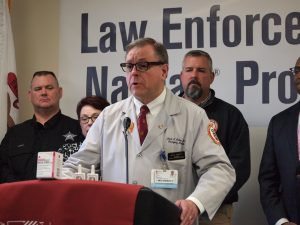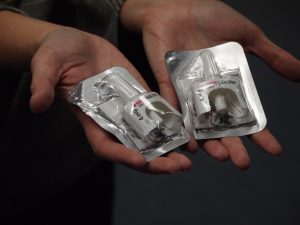Life-saving nasal spray an antidote to opioids
By Kevin Beese Staff reporter — February 5, 2018
Loyola Medicine’s Mark Cichon, chairman of emergency medicine and director of emergency medical services, said that Narcan has been instrumental in saving more than 100 Chicago area residents in the past 18 months. (Photo by Kevin Beese/Chronicle Media)
Bellwood police saved three individuals in the first two days of carrying an antidote for opioid overdoses.
Loyola Medicine officials estimate that more than 100 Chicago area individuals have been saved in the past 18 months through the use of the antidote Narcan.
More than 1,900 officers from 30 suburban police departments, the Cook County Sheriff’s Department and Cook County Forest Preserve police will soon be equipped to administer Narcan for when they encounter someone overdosing from opioids, thanks to a collaboration between Loyola Medicine and the Cook County Department of Homeland Security and Emergency Management.
Narcan counteracts the life-threatening effects of opioid overdoses.
“Opioids are a public health scourge that afflict residents throughout our communities and that we must confront,” Cook County Board President Toni Preckwinkle said. “Putting an antidote in the hands of our first responders and training them how to properly use it will save countless lives.”
In Cook County, there were more than 1,000 opioid deaths in 2017, surpassing both car accidents and murders, Preckwinkle pointed out.
The Cook County Health & Hospital System saw more than 5,000 opioid-related emergency room visits in 2016, up from 1,000 visits in 2006.
Loyola Medicine’s Mark Cichon, chairman of emergency medicine and director of emergency medical services, said the train-the-trainer Law Enforcement Narcan Program is one of the first in the state to have direct medical oversight.
“It is vitally important that our police officers know how to recognize someone suffering an opioid overdose and act quickly to safely administer the overdose reversal drug,” Cichon said. “This program will create a standard of care and a consistency from one police department to the next so we can all tackle this epidemic together.”
Bellwood’s Acting Police Chief Jiminez Allen said having officers ready to help an overdosing individual is vital.

: Robert Wright of the Franklin Park Police Department sprays a dose of Narcan into the air during a training session last week in Maywood, showing police how to administer the opioid antidote. (Photo by Kevin Beese/Chronicle Media)
“When minutes make the difference, it means the world to us to have this ability to save lives,” Allen said.
The Illinois Heroin Crisis Act, passed in 2015, requires all police officers to carry naloxone, the generic name for Narcan, and be trained to administer, store and transport it. However, due to cost and limited access to training, not all departments have complied.
The training program is funded by a $311,000 Edward Byrne Memorial Justice Assistance Grant, the leading source of federal justice funding to state and local jurisdictions.
Under the Law Enforcement Narcan Program, Cook County is the liaison with the police departments and organizes all training sessions. Loyola is responsible for all required medical paperwork, leading all training sessions, and ordering, supplying and restocking all medications for participating police departments.
Officers administer a 4-milligram dose of nasal spray to an overdosed subject who is breathing by inserting the tip of the spray into a nostril and pushing the plunger forward.

Maywood police Det. Angela Patterson examines a dose of the overdose antidote Narcan during a training session. (Photo by Kevin Beese/Chronicle Media)
Naloxone works by blocking opioids — heroin, fentanyl, hydrocodone, oxycodone, morphine, methadone and carfentanil — from the receptor sites in the brain.
The nasal spray dosage used by first responders is higher and more effective than the over-the-counter version, according to medical personnel. Compared with an injected version, the nasal spray is easier to use, costs less, absorbs as quickly and triggers a milder reaction on patients, according to Loyola medical personnel.
Read the digital edition of the Cook County Chronicle
Get your free subscription of the Cook County digital edition
— Life-saving nasal spray an antidote to opioids —-








